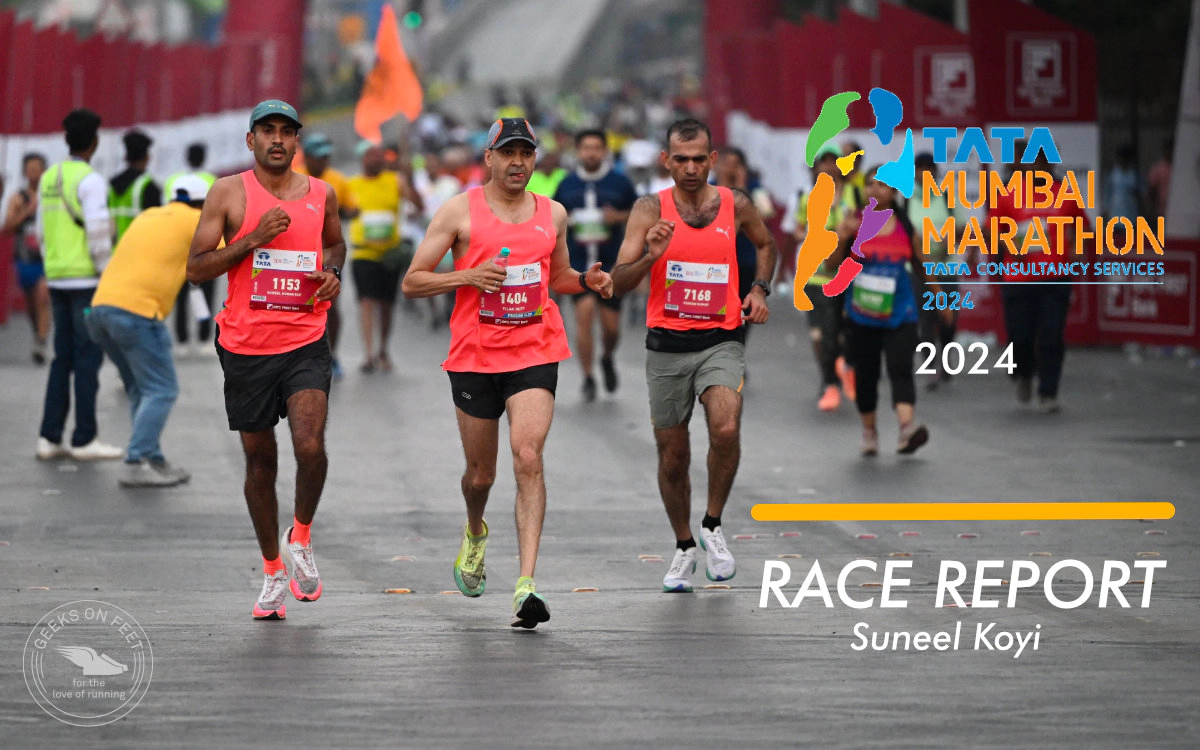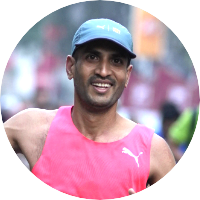
This is a bit unusual probably for GeeksOnFeet readers. But my training is done as part of a team that followed the exact same plan. As part of a four-member team including Suresh, Tilak, and Manju, I trained for 14 weeks. Following our experience in the Bengaluru Half Marathon, we, as a self-coached team, collaboratively crafted a training plan that would guide us through to race day.
Training Plan
Our training was periodized and carefully segmented into distinct phases:
Base Building (Weeks 1-4): Our initial focus was on developing aerobic capacity through long runs. Strength sessions during this phase were essential, building a strong foundation in fitness, particularly in lower body and core areas.
Progressive Marathon Pace Integration (Weeks 5-8): We then began to incorporate marathon pace segments into our long runs. This gradual integration was key to adapting our bodies to the marathon pace. Strength training remained a vital component, ensuring we maintained overall conditioning.
Marathon Pace Emphasis (Weeks 9-12): As the marathon day neared, all long runs were executed close to the marathon pace. We consciously reduced mileage while maintaining intensity, preparing ourselves for the tapering phase.
Taper (Weeks 13-14): In the final weeks, we reduced our overall mileage to ensure optimal recovery. However, we maintained intensity levels to fine-tune our race readiness.
Running six days a week, our regimen included one speed session, one long run, and the rest dedicated to aerobic runs. Complementing our running, we engaged in two strength sessions weekly, targeting key muscle groups essential for running efficiency and injury prevention.
Travel and Acclimatization:
We planned our trip such that we arrived in Mumbai two days prior to the race. This was done to ensure we are optimally rested and acclimatized to Mumbai. This has helped in ensuring we were in peak condition for the marathon.
Strategic Hotel Location:
We chose a hotel that is close to the 42nd kilometer. By doing so we eliminated the stress associated with long commutes on race day, allowing us to focus fully on the race.
Expo Visit:
First agenda upon arrival in Mumbai was the Expo visit. We collected our bibs and connected with local running enthusiasts. The Expo was expansive, buzzing with activities and booths, but I focused primarily on the essentials due to the time constraints.
One of the highlights of the expo was the brief interactions with local running friends, many of whom I knew through Twitter. The Expo ambiance perfectly reflected the vibrant spirit of the running fraternity.
Early Morning Preparations:
The race day commenced with an early rise at 2:30 am, which gave me ample time for all the necessary pre-race preparations. We assembled in the hotel lobby by 4 am, each of us mentally gearing up for the challenge ahead.
Warm-Up Session:
Before heading to the start line, we did a thorough warm-up session right in front of the hotel. This warm-up not only helped me to physically prepare but also helped in calming nerves and getting into the right mental space for the race.
At the Start Line:
We reached the start line by 4:30 am. As I stood at the start line, the energy was palpable, with thousands of runners sharing a singular goal - to conquer the Tata Mumbai Marathon. This moment marked the culmination of all the rigorous training and the beginning of a test of endurance, willpower, and determination.
Pacing Strategy:
Our pacing approach to the Mumbai Marathon was carefully planned, thorough route analysis using resources like GeeksOnFeet’s route preview and interactive maps. We planned a positive split strategy. This also meant targeting our marathon pace on the flat sections and adjusting our pace according to the elevation changes.
We divided the course into three distinct sections:
First 10 Miles: We aimed to cover this distance in 1:05:00. This initial section was critical in setting the pace for the rest of the race.
Next 10 Miles: This part included the Sea Link and was mostly flat with small rolling hills. Plan here was to maintain around the marathon pace, balancing speed with energy conservation.
Race Execution and Team Dynamics:
Suresh, Tilak, and I started the race together, while Manju, with a different pacing plan, raced independently, using us as a reference. Suresh led our pacing.
Despite the initial crowding, which required some adaptations in pacing, and the poorly lit sections post the Sea Link, we managed to stay focused on our pacing strategy. We maintained strong performance until the halfway mark, reaching it at 1:23:58. Tilak’s encouragement was pivotal in keeping our momentum.
However, after the 28 km mark, I started feeling the fatigue. Despite that, I remained focused, mentally breaking the race into manageable sections. When Suresh began to slow down due to cramping sensations, I took the lead, especially in the uphill sections like Peddar Road. We navigated through the crowded sections in a single file. After crossing Peddar Road, Tilak and I picked up our pace again, holding on to the marathon pace. We knew it was a matter of another 20 minutes of effort.
Final Push and Finish:
With a strong home stretch, Tilak and I finished at 2:51:29, narrowly surpassing our target time by 30 seconds. Suresh, showing remarkable resilience, followed just 90 seconds later. Manju also achieved a commendable finish time of 2:55:03. As my Strava data indicates, we executed our plan almost flawlessly, adapting as needed while staying true to our overall strategy.
My splits:
My HR zone distribution:
Hydration and Fueling:
Pre-race planning, particularly in terms of gel intake and hydration, played a significant role. I consumed a gel 10 minutes before the start and followed a strict regime of gel intake every 35 to 40 minutes during the race. Carrying personal hydration bottles with Fast&Up Reload ensured we were well-hydrated and energized throughout.
Experience Stations and Support:
The support and energy at various points along the course were remarkable. Pani Sir’s cheering at Pedar Road and the enthusiastic support at Shivaji Park and Marine Drive significantly boosted our morale.
The moment we crossed the finish line, it was not just an individual achievement but a shared victory. Embracing in hugs of triumph, the joy was palpable.
The crowd support played an integral role in my race experience. Seeing familiar faces from the Bengaluru running community and receiving enthusiastic cheers from them added immensely to the emotional richness of the day. The support received from our hotel roommates, cheering on at various points along the course, provided us with the additional motivation needed for the final push.
Post-race, as I reflected on our journey, I felt a deep sense of gratitude. Gratitude for the shared sweat, struggles, and victories that bound us together. The Tata Mumbai Marathon was more than just a race for me; it was a celebration of dedication, passion, and the resilience that running instills.

Suneel is software engineer by profession. Apart from his passion towards running and cycling he is interested in mobile & wearable tech specifically in payments domain.